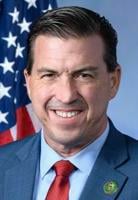The House has passed a roughly $1.2 trillion spending package to end a partial government shutdown. The bill next goes to President Donald Trump for his signature. The vote wraps up congressional work on 11 of the 12 annual appropriations bills, funding the vast majority of the government until Sept. 30. But there's one more funding fight to come. The last bill still to be worked out covers the Department of Homeland Security, where Democrats are demanding more restrictions on enforcement operations. Speaker Mike Johnson says he expects the two sides will be able to reach an agreement on Homeland Security funding by the deadline.
A partial government shutdown is looming at week's end. And now Senate Democratic leader Chuck Schumer has laid out a list of demands for the Department of Homeland Security as the Senate heads toward a crucial Thursday vote on whether to move forward with the spending legislation that funds DHS and a swath of other government agencies. Schumer says Democrats are asking the White House for an enforceable code of conduct for federal agents conducting immigration arrests and a requirement that they identify themselves to the public. Republicans will need Democratic votes to keep the government open when funding runs out at midnight Friday.
The House is looking to pass this year's final batch of spending bills. The effort on Thursday is being complicated by Democratic lawmakers' concerns the measure funding the Department of Homeland Security inadequately addresses President Donald Trump's mass deportation efforts. House Democratic leaders Hakeem Jeffries, Katherine Clark and Pete Aguilar announced in a closed-door meeting they would oppose the Homeland Security bill. With Republicans in charge of both chambers of Congress and the White House, Democrats have few good options to express their opposition. Speaker Mike Johnson voices confidence the funding bills will pass, including the Homeland Security measure.
The House is pushing toward a vote on renewing subsidies for Affordable Care Act plans. It's a remarkable rebuke of House Speaker Mike Johnson, who tried to stop it. But renegade Republican lawmakers joined with Democrats on a so-called "discharge petition" to force action. The health care tax breaks have lowered health insurance costs for roughly 22 million people, but expired last month. The Congressional Budget Office said the proposed three-year extension would increase the nation's deficit by about $80.6 billion over the decade, and increase the number of people with health insurance by millions. Members of the Senate are working on an alternative bill.
Four centrist Republicans have broken with their party's leadership over health care. They've signed onto a Democratic-led petition that will force a House vote on extending for three years an enhanced pandemic-era subsidy that lowers health insurance costs for millions of Americans. The stunning move Wednesday comes after House Republican leaders pushed ahead with a health bill that doesn't address the soaring monthly premiums coming for those with insurance through the Affordable Care Act. A House vote on the subsidies could come as soon as January. Even if it passed, it would face an arduous climb in the Republican-led Senate.
The House is heading toward a vote on a bill to force the Justice Department to release the case files it has collected on the late financier Jeffrey Epstein. Lawmakers are pushing past a monthslong effort by President Donald Trump and Republican leaders to stop the effort. Many lawmakers say the Justice Department needs to release its case files on Epstein. They argue that the release could show that other people were aware or complicit in Epstein's sexual abuse. House Democrats and a few key Republicans have been able to force a vote on the bill to do that by using a rarely successful measure called a discharge petition.
As the House voted to end the longest federal shutdown in American history, San Mateo County congressional leaders were a firm no vote, citing…
President Donald Trump has signed a government funding bill that ends a record 43-day shutdown. The disruption caused financial stress for federal workers who went without paychecks, stranded scores of travelers at airports and generated long lines at some food banks. The signing ceremony came just hours after the House passed the measure on a mostly party-line vote of 222-209. Democrats wanted to extend an enhanced tax credit that lowers the cost of health coverage obtained through Affordable Care Act marketplaces and refused to go along with a spending bill that did not include that priority. But Republicans said that was a separate policy fight to be held at another time, and they prevailed.
House lawmakers are making a long-awaited return to potentially end the longest federal government shutdown in U.S. history. Speaker Mike Johnson is predicting that the House later Wednesday will pass the bill to reopen the government and send it to President Donald Trump's desk for his signature. The large majority of Democrats are expected to vote against the bill because it doesn't extend Affordable Care Act tax credits. Democratic leader Hakeem Jeffries said Democrats can't support an effort to "gut the health care of the American people."
Republicans are swatting down an offer from Democrats to end the government shutdown. Senate Majority Leader John Thune said the new offer from Democrats is a "non-starter." The proposal from Democrats would reopen the government and include a one-year extension of expiring health care subsidies. It's unclear what may happen next. Thune suggested a weekend session of the Senate was possible, and idea that President Donald Trump endorsed in a social media post. Despite the stalemate, lawmakers in both parties were feeling increased urgency to end the shutdown, which has now lasted for 38 days.

















